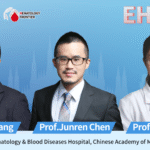
The 18th International Conference on Malignant Lymphoma (18-ICML), hosted by the Fondazione Internazionale per la Ricerca sul Cancro (IOR), was held from June 17–21, 2025, in Lugano, Switzerland. As a premier biennial event in the field of hematologic oncology, this year's congress attracted thousands of hematologists, clinical oncologists, radiation oncologists, and basic science researchers from around the world to deeply explore lymphoma pathogenesis, translational breakthroughs, and therapeutic innovations.At this event, Professor Jianyong Li from the Lymphoma Center of the First Affiliated Hospital of Nanjing Medical University (Jiangsu Provincial People's Hospital) delivered an oral presentation on the Phase I/II study of DZD8586 in patients with relapsed/refractory chronic lymphocytic leukemia/small lymphocytic lymphoma (CLL/SLL) who had previously received covalent or non-covalent BTK inhibitors and BTK degraders. In an exclusive interview with Hematology Frontier, Professor Li shared an in-depth interpretation of the clinical value and future potential of DZD8586.Hematology Frontier: Recent data show that DZD8586 achieved an objective response rate (ORR) of 84.2% in R/R CLL/SLL patients previously treated with covalent/non-covalent BTK inhibitors or BTK degraders. What are the key advantages that drive this efficacy?
Professor Jianyong Li: Chronic lymphocytic leukemia (CLL)/small lymphocytic lymphoma (SLL) is among the more aggressive subtypes of hematologic malignancies. Treatment strategies have evolved dramatically from traditional chemoimmunotherapy to chemo-free approaches.
Targeting Bruton’s tyrosine kinase (BTK) has been the most significant advancement in CLL management, resulting in three generations of agents—covalent BTK inhibitors, non-covalent inhibitors, and novel degraders—establishing a comprehensive therapeutic framework that has notably improved patient outcomes.
However, with expanded clinical use, resistance has become an increasingly prominent challenge. Resistance mutations, including C481X, L528W, and T474I, are frequently observed. Of particular concern is the A428D mutation, which confers resistance across all current BTK-targeted strategies, including covalent and non-covalent inhibitors as well as degraders.
In the face of such challenges, agents like BCL-2 inhibitors and DZD8586 have shown promising potential. DZD8586, in particular, is designed to simultaneously inhibit both BTK and LYN. In vitro studies have demonstrated its potent activity against not only the classical C481X mutation but also less BTK-dependent mutations such as L528W and A428D.
Oral presentations at both ASCO and ICML 2025 revealed that DZD8586 achieved an ORR of 84.2% in heavily pretreated CLL/SLL patients, with tumor shrinkage observed across all subgroups—highlighting its strong antitumor efficacy and potential to overcome multidrug resistance.
Hematology Frontier: At the 2025 ASCO and EHA annual meetings, a first-in-human oral presentation reported pooled Phase I/II data on DZD8586 in patients with relapsed/refractory (R/R) CLL/SLL previously treated with covalent or non-covalent BTK inhibitors and BTK degraders. Notably, DZD8586 demonstrated no drug-related bleeding, atrial fibrillation, or major cardiovascular events, and showed favorable CNS penetration. At ICML, you presented further subgroup analyses. Could you highlight the key findings from this analysis and discuss which patient populations may benefit most from DZD8586?
Professor Jianyong Li: DZD8586, a non-covalent dual LYN/BTK inhibitor, has shown promising efficacy across multiple subgroups with varying prognostic profiles. This includes patients previously treated with BTK inhibitors, BTK degraders, or BCL-2 inhibitors, as well as those carrying high-risk genetic features such as TP53 mutations or complex karyotypes. These results suggest that DZD8586 may offer a valuable treatment alternative for patients with limited therapeutic options.
From a safety standpoint, long-term toxicity management is critical in CLL/SLL treatment. Our study showed that DZD8586 is well-tolerated. Hematologic toxicities, primarily thrombocytopenia and neutropenia, were mostly grade 1–2. While some cases of pneumonia were reported, they were clinically manageable. Importantly, no instances of atrial fibrillation or severe bleeding—adverse events commonly associated with traditional BTK inhibitors—were observed, and there were no treatment-related deaths. This favorable safety profile supports the potential for long-term use.
Given its ability to overcome multiple resistance mechanisms and its encouraging safety data, DZD8586 may be further explored in other BTK-sensitive lymphomas, including mantle cell lymphoma (MCL), Waldenström macroglobulinemia (WM), marginal zone lymphoma (MZL), follicular lymphoma (FL), and the MCD subtype of diffuse large B-cell lymphoma (DLBCL). Expanding into these indications represents an important direction for future research.
Hematology Frontier: From a translational clinical perspective, how do you see the positioning of DZD8586 within the overall treatment landscape of CLL/SLL? What are your thoughts on its potential applications in other lymphoma subtypes?
Professor Jianyong Li: Current clinical data suggest that DZD8586 offers a breakthrough in overcoming resistance along the BTK signaling pathway. From a translational standpoint, its favorable safety profile supports the potential for earlier-line use in treatment sequencing. Given its efficacy and tolerability, there is strong rationale for expanding DZD8586’s indications to include other lymphoid malignancies such as mantle cell lymphoma (MCL), Waldenström macroglobulinemia (WM), marginal zone lymphoma (MZL), follicular lymphoma (FL), and the MCD subtype of diffuse large B-cell lymphoma (DLBCL).
Looking ahead, as we continue to unravel the complexities of signaling networks and advance the development of novel targeted agents, I believe we are moving toward a new era of transformative therapeutic strategies in hematologic malignancies.
Expert Profile

Jiangsu Provincial People’s Hospital
- Doctoral supervisor and postdoctoral mentor
- Director of the Lymphoma Center and Class-A Distinguished Professor / Second-Level Professor at the First Affiliated Hospital of Nanjing Medical University (Jiangsu Provincial People’s Hospital)
- Standing Committee Member of the Hematology Branch of the Chinese Medical Association; Head of the Lymphoid Diseases Group
- Former Chair of the Hematologic Oncology Committee, Chinese Anti-Cancer Association (CACA)
- Vice Chair, Lymphoma Quality Control Expert Committee, National Cancer Quality Control Center
- Head of the Chinese CLL Working Group
- Vice Chair, Lymphoma Expert Committee, Chinese Society of Clinical Oncology (CSCO)
- Deputy Leader, Lymphoma Group, Oncology Branch, Chinese Medical Association
- President, Hematology Physicians Branch, Jiangsu Medical Association
- Chair, 7th Hematology Committee, Jiangsu Medical Association
- Founding Chair, Hematology Branch, Jiangsu Geriatrics Society
- Honorary Chair, Hematology Committee, Nanjing Medical Association
- Vice President, China Hematologic Disease Specialist Alliance
- Vice Chair, Hematology Institutions Branch, Chinese Hospital Association
- Vice Chair, Hematopoietic Stem Cell Transplantation and Cellular Therapy Committee, China Medical Education Association


